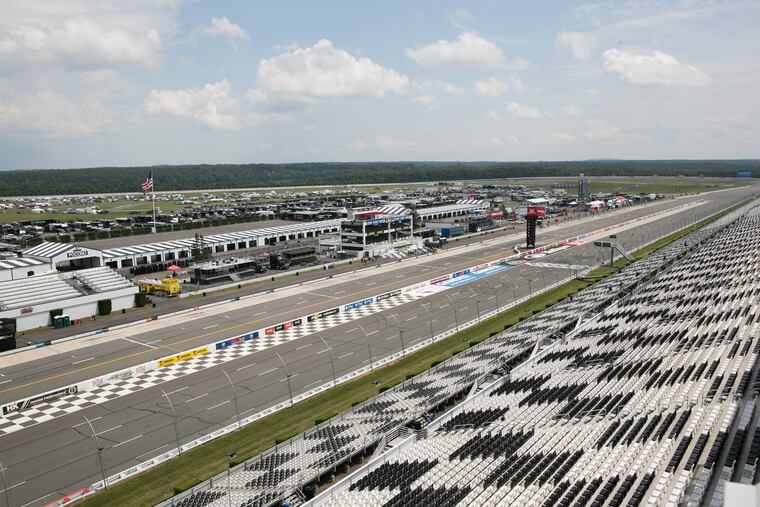NASCAR and organic food make a run together in the Poconos
Pocono Organics will partner with the Berks County-based Rodale Institute to grow vegetables and fruit for the fans and race crews, while helping create farming jobs for veterans.

LONG POND, Pa. — Once, in the hazier, unhealthier past, NASCAR fans at Pocono Raceway could load up on free cartons of cigarettes as part of the weekend's festivities.
Last Friday morning, the recreational vehicles and campers were already lining up by the raceway's entrance here in Monroe County in anticipation of the Gander Outdoors 400 race on Sunday. These days, the races are sponsored by a caffeinated energy drink, not tobacco companies, but out in an old spinach field adjacent to the track, something even healthier is set to take root.
"The market is not just chicken fingers and french fries," Nick Igdalsky, the Raceway's CEO, said of the concessions inside. "Yeah, there's going to be a lot of that, but what about the lettuce and tomatoes that go on top of it?"
That's where Pocono Organics, an unlikely partner and neighbor to a NASCAR racetrack, will come in once its first harvest arrives next year. The 50-acre farm is the brainchild of Ashley Walsh, granddaughter of the late Joseph Mattioli, Pocono Raceway's founder. It will include 40,000 square feet of greenhouses, a living "vegetative" roof that will collect rainwater, and an additional 30,000-square-foot processing and storage building, all connected to the track's 39,000-plus solar panels.
Pocono Organics will also eventually have a storefront, wedding space, and host wellness and yoga retreats, all across the street from a venue fueled by gasoline, rubber, and light beer. Fruit and vegetables grown there will be used at the raceway, both for the fans and all the racing crews, and in turn, the raceway will supply compost from leftover food, which adds up with a capacity of 76,000-plus.
"Every summer since I was 10 years old, I've worked here," said Walsh, 37. "I started picking up cigarette butts and painting the checkers on the track, which would take all summer and you'd have to do it over again."
Walsh said dietary issues — a diagnosis of gastroparesis in her mid-20s — led her to organic living, and she's had the need to spread the message.
"My body wasn't digesting food properly," she told a crowd that gathered in the field for the groundbreaking Friday. "It made me very ill, like having a stomach flu every day."
So, like her grandfather, who built a racetrack from scratch, Walsh said she decided to think big about farming and build one of the largest organic facilities of its kind in northeast Pennsylvania.
Pocono Organics is partnering with the Berks County-based Rodale Institute, a 71-year-old nonprofit dedicated to organic farming and healthy living. Walsh cold-called Rodale, and Jeff Moyer, the institute's executive director, was surprised to hear from her.
"Initially, we were like, 'Why is a racetrack calling an organic research station?' " Moyer said. "But what seemed like a mismatch quickly grew into a really exciting opportunity."
Moyer's team has already begun testing soil on the farm, which produced spinach in the 1940s but today is full of grass and weeds.
"It's not a vegetable field right now, but come next year, it will be," he said. "It's going to take a lot of work between now and then."
Walsh said Pocono Organics will create 100 jobs, including the construction set to take place in the coming year, and with Rodale, focus on employing veterans looking to transition into organic farming.
Rodale started the veteran-training program three years ago, coordinator Lyndsey Antanitis said, and many have gone on to start their own small farms and roadside stands. Antanitis said more than 460,000 veterans live in northeast Pennsylvania.
"Many of them don't want to work in an office," she said. "They need to be outside."
Walsh and Moyer said Pocono Organics was studying what fruits and vegetables the raceway uses the most and will plant a large portion of the farm to fill that need.
"We know, certainly, that potatoes get used en masse, so potatoes will be a big part of what we grow," Moyer said. "We'll grow a little bit of all things, and a whole lot of some things."